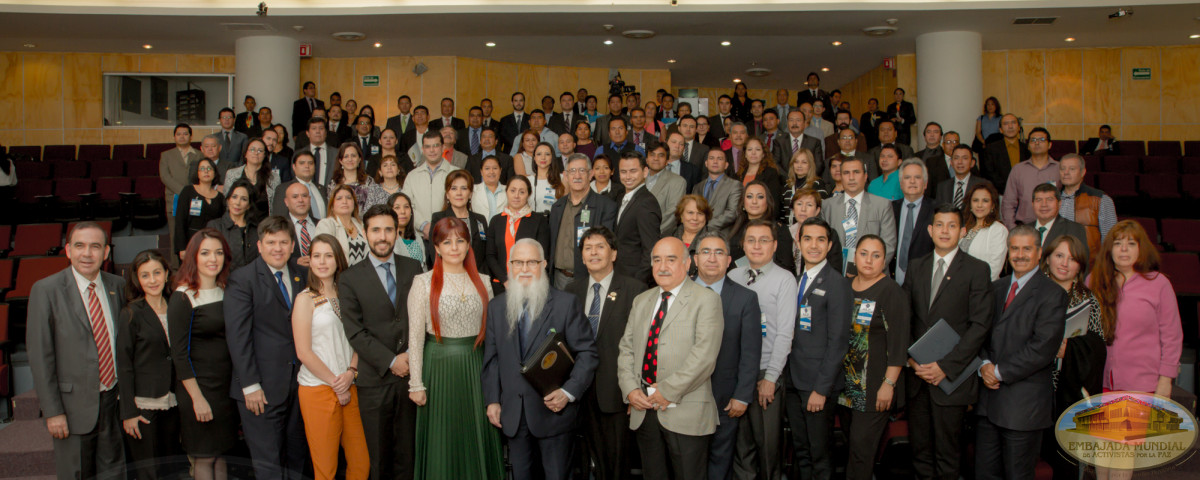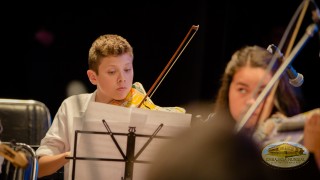The Global Embassy of Activists for Peace, working for the restoration of peace and happiness of the human family, of the nations and of Mother Earth.
The Global Embassy of Activists for Peace (GEAP) is a non-profit global organization, arising from the inspiration of renowned international pacifist, William Soto Santiago, who, for decades, has led numerous initiatives and campaigns in favor of Human Rights, the Rights of Mother Earth and an education for peace.
It has active volunteers in Argentina, Bolivia, Brazil, Chile, Venezuela, Colombia, Ecuador, Peru, Paraguay, Spain, United States, El Salvador, Guatemala, Honduras, Nicaragua, Costa Rica, Panama, Mexico, Dominican Republic and Puerto Rico, who work voluntarily and altruistically for the successful, well-being, happiness and peace of the human family and the sustainability of Mother Earth, through the development of initiatives, projects and campaigns aimed at different areas of humanity within the framework of universal values and principles of Human Rights and the Rights of the Earth.
For the global ambassador, the fundamental premise that infuses each project of the institution is to consider that "education is a power; the most powerful weapon to transform mentalities and therefore a key mechanism for changing societies; and consequently, to change the world."
Programs and projects that are currently being developed:
1. PROGRAM "EDUCATING TO REMEMBER"
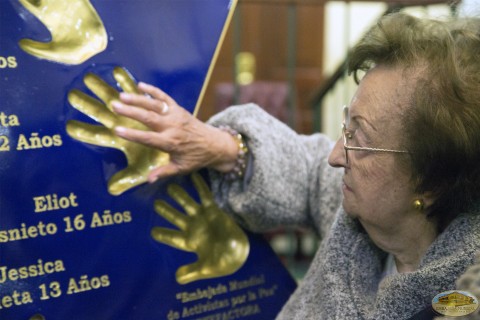 The program "Educating to Remember" aims to: strengthen, through a comprehensive education, the teaching of principles and ethical, moral and spiritual values; the reflection and practice of actions towards universal rights and human dignity, based on the study of the history of the Holocaust and other genocides, since these events left universal lessons that must be transmitted to present and future generations, to form human beings who can actively work for the peace of the human family.
The program "Educating to Remember" aims to: strengthen, through a comprehensive education, the teaching of principles and ethical, moral and spiritual values; the reflection and practice of actions towards universal rights and human dignity, based on the study of the history of the Holocaust and other genocides, since these events left universal lessons that must be transmitted to present and future generations, to form human beings who can actively work for the peace of the human family.
"Educating to Remember" works in four fields of action:
- "Traces to Remember"
- Law Project "The Holocaust, paradigm of genocide "
- Educational program "Educating to Remember"
-
Chair of Human Rights and Holocaust
2. INTERNATIONAL PROGRAM "CHILDREN OF MOTHER EARTH"
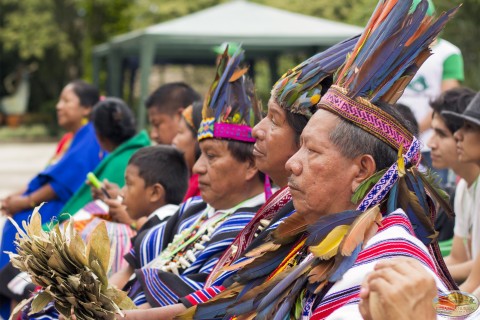 1. The International Program "Children of Mother Earth" is a social program designed to provide solutions and promote citizen participation in actions for a sustainable development and future, to ensure the continuity of human life, in harmony with our Mother Earth.
1. The International Program "Children of Mother Earth" is a social program designed to provide solutions and promote citizen participation in actions for a sustainable development and future, to ensure the continuity of human life, in harmony with our Mother Earth.
This Program of the GEAP is aligned with the UN’s Global Agenda for Sustainable Development, because its objective is to protect, save and restore Mother Earth with actions aimed at promoting sustainable development and its four dimensions, harmonically integrating the social, environmental, cultural and economic field in all areas of action, projects and campaigns of said program. Moreover, protection of the planet Earth according to what is stated in the document: "To transform our world. The 2030 Agenda for Sustainable Development".
This program is made up of a group of projects, campaigns, and actions under four fields of action:
- Environmental governance and justice;
- Education, communication, and culture for the peace of Mother Earth and its sustainable development;
- Promotion of the ancestral culture of the indigenous peoples of Mother Earth for a sustainable development;
- The restoration and protection of Mother Earth.
3. "JUSTICE FOR PEACE"
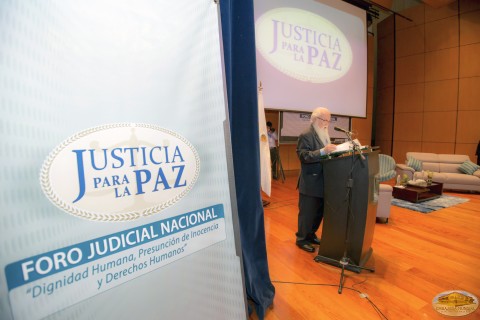 The program "Justice for Peace" has national and international fields of action.
The program "Justice for Peace" has national and international fields of action.
At the international level, it aims to update and amend the Convention for the Prevention and Punishment of the Crime of Genocide, the Rome Statute and the Regulations of the United Nations. These amendments propose to broaden the spectrum of protection to other groups excluded on the crime of genocide, including other genocidal behaviors such as ethnocide or forced pregnancy for genocidal purposes’ democratize the UN by increasing the number of permanent members of the Security Council, eliminating or rationalizing the right to veto when the concern is about preventing, investigating or prosecuting the crime of genocide; and strengthen the International Criminal Court (ICC) and its Attorney General.
At the national level, the program seeks to revise, update and modify the laws of different countries in order to strengthen the administration of a justice for peace, clarify the scope and promote the respect for human dignity, the presumption of innocence and human rights, as well as the recognition and respect for the victims to know the truth, towards justice, reparation and the guarantee that it will not happen again.
For the success of the Program "Justice for Peace" it is necessary to socialize and enrich the proposal through various academic meetings, such as the International Judicial Forums, the Justice and Democracy Session of the Peace Integration Summit (CUMIPAZ), and the National Judicial Forums "Human Dignity, presumption of innocence and Human Rights".

Endowing upon the UN, the International Criminal Court, and, in general, to the Universal Justice and each country, the democratic tools needed to strengthen the structure, independence, autonomy and efficiency to prevent and punish genocidal atrocity, as well as discrimination and violation of human rights, in order to preserve peace and security in a globalized world.
Program "Justice for Peace" consists of six fields of action:
- Project: "New Proposals for the Prevention and Punishment of the Crime of Genocide"
- Project: "Democratization of the UN"
- Project: Typification of Genocide
- Project: "Strengthening the International Criminal Court"
- Project: "Promotion and protection of human rights"
- Project: "PRODIG" (Program of Disclosure of Genocide investigations around the world).
4. INTEGRAL PROGRAM OF BLOOD DONATION

"Life is In the Blood - Donating the Sap of Life"
The Integral Program of Blood Donation "Life is in the Blood" is a program of social intervention, which proposes a socio-cultural and selfless contribution, based on the principle of love for life; which promotes solidarity, respect for human dignity, improvement of the quality of life, social justice, peace and happiness among the whole human family.
General objective
Contribute to the formation of a culture of voluntary, altruistic and regular safe blood donation to increase the active and effective participation of citizens, in order to ensure the supply of blood and blood components to every person who requires it.
The strategic components of this program are:
- Communication Educational Program for the Formation of a Culture of Voluntary, Altruistic and Regular Safe Blood Donation (PEC-VIDA), aimed at the family, community, educational and organization field.
- International campaign "Life is in the Blood - Donating Sap of Life".
- Law proposal for the Promotion of Voluntary, Altruistic and Regular Safe Blood Donation.
5. THE POWER OF MUSIC FOR PEACE AND HAPPINESS OF THE INTEGRAL HUMAN BEING

General objective
To promote the power of music as a tool to achieve peace among human beings, sowing in the heart of the people ethical, moral and spiritual values; harmonizing the individual with himself, with others and with Mother Earth; in order to achieve the formation of healthy, whole and happy human beings.
The strategic fields of this program are:
1. Musical system for the harmony of the human being
Music is energy and therefore, it mobilizes humans from birth, even from the prenatal stage. Through creation or hearing, music prints an energy of global character that circulates freely inside the person and then projects itself through multiple self-expressions.

This field of action promotes:
- The implementation of the frequency of peace: 432 Hertz
- Recovery of music from the indigenous people.
2. Musical education system for the peace and happiness of the integral human being.
Dr. William Soto re-affirms that the secret of the impact of music is that it can travel straight into the soul and heart of the person, it can skip the process of reflection and analysis, which means that does not reason, it can directly impact the sub consciousness, making it a power to educate quicker and more effectively than any other art; It reaches the heart, sowing its seed in the soul; and if it is accepted that freedom of choice that all people have, from there it is reflected in actions.
This field of action promotes:
- Music as a tool for education
-
Music as a universal language
 6.
6.
INTERNATIONAL ALLIANCE OF UNIVERSITIES FOR PEACE (ALIUP)
The ALIUP consists of universities, colleges of education, deans, government agencies, international organizations, accrediting agencies and regulatory authorities, teachers, youth leaders and the business sector.
Its purpose is to: promote the appreciation of peace as a universal value, the development of projects, sharing experiences and the creation of institutional networks, professionals and students who will promote the culture of peace and human rights, as well as the creation and development of an International Chair on a Culture of Peace and Universal Values as main subjects in the formation of Higher Education institutions.
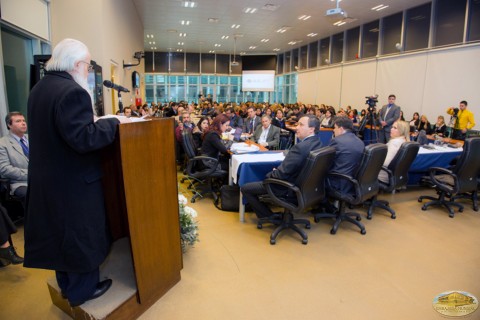
General objective:
To build a culture of peace through quality education, oriented towards developments of professional skills based on universal principles and spiritual values, with respect and the promotion and protection of human rights, and a sustainable development.
Specific objectives.
To encourage in universities and higher education institutions the establishment of an education in values, promoting peace within each person and between nations as something positive for the development of professional skills.
Create and develop educational programs that promote the peaceful settlement of disputes and respect for human rights within lessons, research and their own extension of Higher Education.
Promote among institutions and professionals of Higher Education a network of academic cultural, scientific and cultural exchange to develop projects and campaigns aimed promoting peace, education for a sustainable development and happiness of the human family.
The International Alliance of Universities for Peace (ALIUP) develops projects in the institutional field, with teachers and students related to university extension and research.
